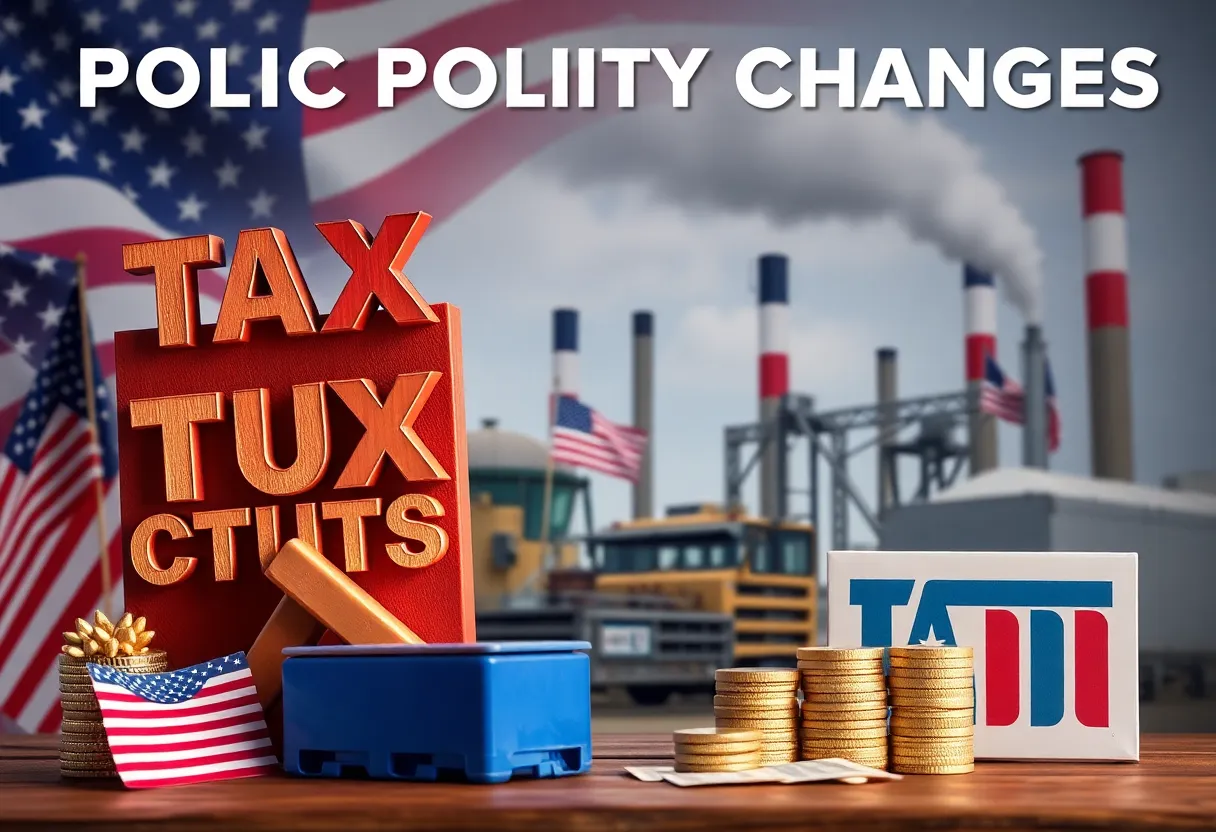

A conceptual image illustrating the changes in tax initiatives and tariff policies under the Trump administration.
In a recent meeting, President Trump outlined his tax priorities aimed at reshaping America’s tax landscape to support the middle class. Key proposals include eliminating taxes on tips and overtime pay, renewing tax cuts from the 2017 Tax Cuts and Jobs Act, and adjusting the cap on SALT deductions. Coupled with new tariff policies targeting Canadian imports and addressing trade relations with China, the administration’s initiatives signal a significant shift in tax and trade strategies, triggering a response from trade partners and rising concerns over economic impacts.
In a recent meeting at the White House, President Donald Trump laid out his tax priorities while conferring with House Republican leaders. The discussions revolved around a range of initiatives aimed at reshaping America’s tax landscape to bolster the middle-class and strengthen the nation’s financial foundation.
One of Trump’s core goals is to eliminate taxes on tips, seniors, Social Security, and overtime pay – measures that many believe would significantly ease the financial burden on everyday Americans. The urge to renew tax cuts from the 2017 Tax Cuts and Jobs Act (TCJA) is becoming increasingly pressing, especially as several of its provisions are set to expire later this year.
Trump highlighted adjustments to the cap on State and Local Tax (SALT) deductions, a matter that’s sparked quite a bit of discussion among Republicans in high-cost states. Equally noteworthy is his proposal to eliminate special tax breaks tailored for billionaire sports team owners while closing the loophole of the carried interest tax deduction, which has long been a controversial subject.
As part of his agenda, Trump also mentioned instituting tax cuts aimed at products labeled “Made in America.” By augmenting domestic production, the administration hopes to create jobs and invigorate the economy.
The House Republicans are currently mulling over a one-bill budget plan that covers Trump’s tax priorities as well as border security issues. Senate Budget Committee Chairman Lindsey Graham shared plans to advance a bill focusing on border, defense, and energy matters, with tax issues slated for future discussions.
Amidst these tax deliberations, Trump has also rolled out new tariff policies. This includes a hefty 25% tariff on Canadian goods, a 10% tax on imports of oil, natural gas, and electricity, and the same percentage on imports from China. Illinois Governor J.B. Pritzker criticized these tariffs, indicating they would place a substantial burden on working families, particularly in states that rely heavily on trade with Canada and Mexico.
Pritzker has described the tariffs as the “Trump tax,” arguing they threaten jobs and could elevate prices for essential goods. Experts have acknowledged that increased import taxes could lead to a spike in prices for consumers, exacerbating inflationary pressures and further complicating the economic landscape in the U.S.
On the global stage, both Canada and Mexico have indicated they’ll respond to Trump’s new trade policies with retaliatory tariffs, heightening tensions in North American trade relations. In a similar vein, the Chinese government has signaled it will take steps to safeguard its economic interests and is preparing to file a lawsuit with the World Trade Organization in response to U.S. tariffs.
Experts caution that the ongoing imposition of tariffs could reduce American purchasing power, with some estimates suggesting that a typical American household may lose around $1,245 this year. The tariffs, which target a variety of goods from alcohol to agricultural products, could create a ripple effect, leading to job cuts and higher prices in stores throughout the U.S.
Despite acknowledging the potential challenges, Trump maintains that these tariffs are necessary for the broader objectives of economic growth and security. The administration frames tariffs as a strategy not only against trade inequities but also as a means of combating illegal immigration and drug trafficking.
As discussions advance and plans take shape, all eyes will be on how these tax and trade initiatives unfold. With a mix of appreciation and concern from different stakeholders, the fate of many American families and the overall economy hangs in the balance.
News Summary A delegation of Democratic lawmakers visited Louisiana to support Mahmoud Khalil and Rümeysa…
News Summary Elon Musk has announced he will reduce his involvement at the Department of…
News Summary The National Institutes of Health (NIH) is initiating a comprehensive autism study led…
News Summary Ryan Mindell, executive director of the Texas Lottery Commission, has resigned as investigations…
News Summary A Columbus man, Noah Baker, is facing serious charges for allegedly attempting to…
News Summary The City of Starkville, Mississippi, is inviting bids for its Parks Signage Project.…